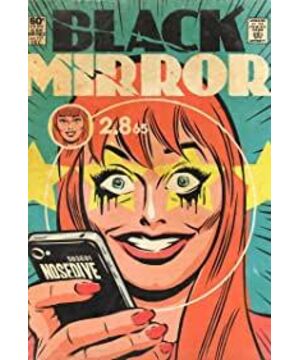The third episode of the third season of Black Mirror made me flustered, so I gave this long review to this episode "Dance of Black Letters" first... It can also be considered to relieve the depressed mood. In my opinion, the point of this episode is not about pedophilia, not about fear that can breed crime, not about something that can't be understood... but when technology gradually penetrates into everyday life, people are deprived of space for discussion... everything becomes " God said a good ending." Let's talk about the difference between "morality" and "ethics": (only personal discussion is not rigorous) The most important difference between "morality" and "ethics": when a thing is tied to the label of "morality", it has been Contains a generally accepted standard of judgment or value judgment; "ethics" does not (again: ethics is anything between people). For example: (1) Infidelity within marriage. In the general view, the cheating party should be morally condemned, even if you say that you are in true love and for each other's happiness, but at least get divorced before doing things. Infidelity in marriage (both physical and mental first) is a moral issue and should not happen. (2) Same-sex love. Long long ago, homosexuality was also condemned, considered immoral, and even stoned and hanged; now, although the public does not fully approve it, at least this matter can be discussed and explained. So homosexuality is no longer a moral issue, but an ethical one. Therefore, the difference between "morality" and "ethics" is again reflected in: moral issues (in a relatively fixed era) are basically not allowed to be discussed, and ethical issues need to be discussed. Counting legal issues, ethics, morality, and law present the following relationship: Ethics → Morality → Law (The closer to the right an issue arises, the less room for discussion.) Back to this movie. Young men watching indescribable masturbation was secretly recorded. I don't know much about the pedophile issue, and don't know if it's a crime to please myself while looking at images of minors. Anyway, the male protagonist was threatened for his masturbation video. So where should this matter be classified? I don't know, but at least this issue is moving between "ethics → morality → law" and can be discussed, but it may also be directly classified as illegal under some laws. But at least, this masturbation thing has room for discussion. (As an aside, even if my relatives and friends received videos of me masturbating, I don't believe they would unanimously condemn me, especially those who are the same age...→_→) Then, the male protagonist was threatened and hacked by high-tech. . The male lead was threatened that his video would be made public if he didn't do what he was asked to do. What does "public" mean? "Public" is not only to let everyone know about the male protagonist's masturbation, but also to imply that the male protagonist, when everyone knows, everyone will judge you with a unified standard, and this judgment is to accuse, abuse, cast aside, and even make you lose Human dignity. Coupled with the hero's inner fear and cowardice, this hint is amplified. The shameful thing about the male protagonist is captured and spread by high-tech; more importantly, in the process of high-tech operation, this common physiological problem is firmly nailed (at least) the label of "morality" , so that the male protagonist cannot feel the possible room for discussion, which makes him nervous, fearful, and suffocated. If insisting on pedophile's unclean behavior directly violates the law, that's another story. Choosing to watch pedophile images and masturbation is estimated to be a design by the filmmakers to increase the blur and expand the space for discussion. On the contrary, in the eyes of the male protagonist, coupled with the threat of this invisible and intangible "high-tech", this discussion space has been forcibly compressed. Directly lead to his obedience, resulting in extreme emotions and behavior. Directly prompts him to commit a crime (homicide, legal issues). Originally, a matter that could be discussed and had room for communication; under the pressure of high technology (email or aerial camera), the male protagonist forcibly evolved into an unquestionable vicious incident. The tragedy of the hero's character; or the tragedy of the application of technology. A "fuzzy" ethical issue has been classified as a "moral issue" in the blockade of technology (information dissemination). This made the male protagonist who was "publicly" threatened, alone, unable to resist the unformed but seemingly non-existent moral condemnation, and chose "real" extreme behavior. The solution of the problem requires more discussion space,
(Any act of harming children should be criticized and punished by law.)
View more about Nosedive reviews











